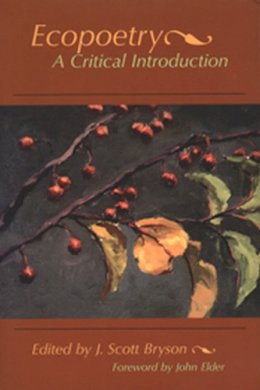
Stock image for illustration purposes only - book cover, edition or condition may vary.
Ecopoetry: A Critical Introduction
Scott Bryson
€ 24.54
FREE Delivery in Ireland
Description for Ecopoetry: A Critical Introduction
Paperback. Editor(s): Bryson, J.Scott; Elder, John. Num Pages: 272 pages. BIC Classification: DSC; RNC. Category: (G) General (US: Trade). Dimension: 228 x 153 x 21. Weight in Grams: 440.
The burgeoning field of ecocriticism is beginning to address the work of such ecopoets as Gary Snyder, Mary Oliver, W. S. Merwin, and Wendell Berry, among others, whose poems increasingly deal with ecological and environmental issues. Ecopoetry: A Critical Introduction assembles previously unpublished contributions from many of the most important scholars in the field as they discuss the historical and crosscultural roots of ecopoetry, while expanding the boundaries to include such themes as genocide and extinction, the lesbian body, and post colonialism. This volume gathers these necessary voices in the emerging conversation regarding poetry’s place in the environmental debate.
The burgeoning field of ecocriticism is beginning to address the work of such ecopoets as Gary Snyder, Mary Oliver, W. S. Merwin, and Wendell Berry, among others, whose poems increasingly deal with ecological and environmental issues. Ecopoetry: A Critical Introduction assembles previously unpublished contributions from many of the most important scholars in the field as they discuss the historical and crosscultural roots of ecopoetry, while expanding the boundaries to include such themes as genocide and extinction, the lesbian body, and post colonialism. This volume gathers these necessary voices in the emerging conversation regarding poetry’s place in the environmental debate.
Product Details
Format
Paperback
Publication date
2002
Publisher
University of Utah Press
Condition
New
Number of Pages
284
Place of Publication
Salt Lake City, United States
ISBN
9780874807011
SKU
V9780874807011
Shipping Time
Usually ships in 7 to 11 working days
Ref
99-1
Reviews for Ecopoetry: A Critical Introduction
The essays are uniformly thoughtful, perceptive, and readable...[and] engage the current scholarship gracefully, without pretense or pedantry. Each chapter is stuffed with insights." —John Tallmadge, The Union Institute
